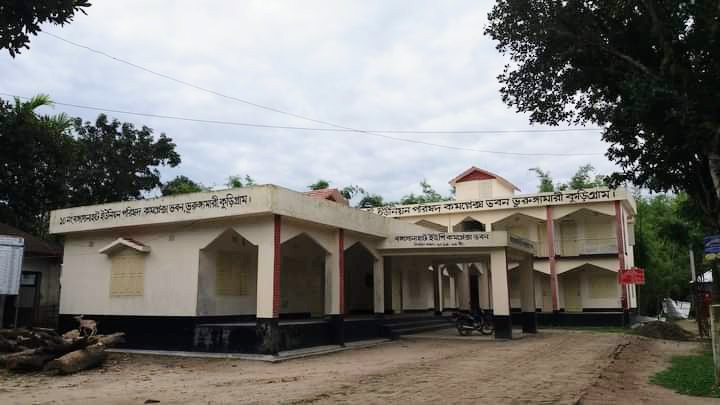-
-
-
-
-
Home
-
About Union
Geographical & Economic
Miscellaneous
-
Union Parishad
Union Council
Activities of Union Council
-
Govt Office
Agriculture
Land
Health Services
Social Service
-
Other Institutions
Educational Institutions
Religious Organizations
Organizations
-
Different Lists
List of Beneficiaries
Other listings
- Projects
-
Services
UDC
National E-Service
The functions of the Union Parishad are as follows-
1. Duties and functions of the Union Parishad:
The mainstay of the economic structure of Bangladesh is agriculture in rural areas. The lowest body of local government is located in Union Parishad village. Union Parishad is a responsible organization for the economic, social and cultural development of its area. According to the Village Ordinance of 1986, the Union Parishad has limited the jurisdiction of the court. In paragraphs 30 to 33 of the Local Government (Union Parishad) Ordinance, 1973, the powers and functions of the Union Parishad are divided into the following six parts.
(A) Citizenship.
(B) Police and defense.
(C) Revenue and administrative responsibilities.
(D) Developmental responsibilities.
(E) Responsibilities transferred.
(F) court or judicial responsibilities.
2. Mandatory work of Union Parishad:
(A) To maintain law and order and to assist the administration in this matter.
(B) To take various measures to curb crime, disorder and smuggling.
(C) Adoption and implementation of developmental projects in agriculture, afforestation, fisheries and animal resources, health, cottage industries, irrigation, communication, education, floods, etc.
(D) Expansion of family planning activities.
(E) To develop and ensure the use of local resources.
(F) Preservation of government property such as roads, bridges, culverts, dams, canals, telephones, electricity etc.
(G) To review the development activities of other organizations at the union level and to make recommendations in this regard to the Upazila Nirbahi Officer if necessary.
(H) To encourage the people to use hygienic toilets.
(I) To register births and deaths, blind, beggars and the destitute.
(J) Conducting all types of censuses.
3. Details of the functions of the Union Parishad:
01. Panchshala and various term development plans prepared.
02. Rural infrastructure development, conservation and maintenance.
03. related to education and primary and mass education activities.
04. Implementation of activities related to health and family planning.
05. Necessary activities for agriculture, fisheries and animal resources and other economic development.
06. To take necessary activities in epidemic control and disaster management.
07 Assignment and collection of taxes, fees, tolls, fees etc.
08 Performing necessary activities related to family dispute resolution, women and child welfare.
09 To take necessary initiatives and provide cooperation in sports, social development culture etc.
10 To take necessary measures for the development and protection of the environment.
11 To fulfill the responsibilities assigned by the government to maintain law and order and to take necessary action.
12 Birth and death registration.
13 To protect government places, open spaces, parks and playgrounds.
14. Lighting of lamps in the streets and government places of 14 Union Parishads.
15. Planting and conservation of trees and prevention of theft and destruction of tree resources.
16. Maintenance and management of cemeteries, crematoriums, public meeting places and other government property.
17. Prevention of unauthorized entry into highways, highways and government places and prevention of nuisance and its causes in these places.
18. To prevent damage, destruction or destruction of highways and highways.
19. To ensure collection, removal and management of dung and road waste.
20. Criminal and dangerous business control.
21. Removal and control of dead animals and control of slaughter of animals.
22. Construction and reconstruction of new houses, buildings and control of dangerous buildings in 22 unions.
23. Management and conservation of 23 wells, water taps, reservoirs, ponds and other sources of water supply.
24 To prevent contamination of drinking water sources and prohibit the use of water from wells, ponds or other sources of water suspected to be harmful to public health.
25. Prohibiting or controlling the use of raw or animal bathing materials in or near wells, ponds or other places supplied for drinking water.
26. Controlling the weeding of jute or other wetting in ponds or other places of water supply or nearby places.
27 Prohibition or control of dyeing or tanning of leather in residential areas.
28. Prohibition or control of excavation of stones or other objects by excavating soil in residential areas.
29 Prohibition or control of construction of bricks, earthenware or other kilns in residential areas.
30. To take necessary action in case of storms, earthquakes or other natural calamities including fire, flood, hail and provide full-time assistance to the government.
31 To maintain a list of widows, orphans, the poor and the needy.
32. To encourage the development of cooperative movement and rural industries.
33 To take measures for additional food production.
34 To control and maintain the loss of cattle.
35. Arranging
36. primary medical centers.
37.To take other necessary measures for the safety, comfort or convenience of the residents of
38 Encouraging the introduction of e-governance.
Expansion of cooperation with other organizations engaged in similar activities like 36 Union Parishads.
39 Responsibilities imposed by the Government from time to time
Planning and Implementation: Cabinet Division, A2I, BCC, DoICT and BASIS






